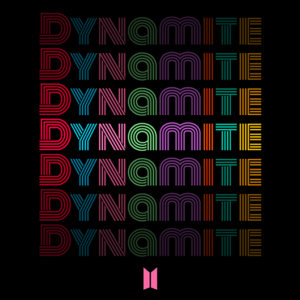
2020 is a year that will go down in history, but in the world of K-pop, it may very well be known as the year that “Dynamite” by BTS was released. The song broke records and is a significant achievement for the group. The song, with lyrics completely in English, does raise questions about how it fits into K-pop. Of course, English is no stranger to K-pop. It has always been around in artists’ names and as nonsense lyrics, but English has become more important in K-pop. The progressively important role that English plays in K-pop is inevitable as artists seek to both strengthen their global fanbase and recognition.
English was first incorporated into the genre of K-pop as a marker of youth and modernity. The intended audience of K-pop was Korean youth, and Jamie Shinhee Lee explains that to this demographic, the English language was a method of asserting artists’ global, liberal identities. The fusion of English into various aspects of K-pop was a natural way to appeal to their target audience. One such way English was inserted into K-pop is through group names. For example, the first generation K-pop group from SM Entertainment, H.O.T., which stands for Highfive of Teenagers. This trend obviously did not die down, and any modern K-pop fan will no doubt be able to name an artist with an English or English-sounding name from any K-pop generation such as Super Junior, Twice, and Stray Kids. Indeed, Dal Yong Jin and Woongjae Ryeo explain that the incorporation of English into K-pop was a very deliberate move in an attempt to appeal to an audience of Korean youth.
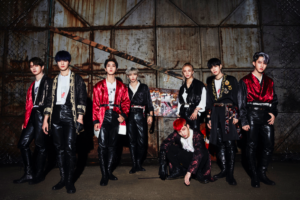
However, there was a recognition in the industry that English in K-pop assists in reaching an international audience both inside and outside Asia. Lee points out that in Asia, English is, politically, a more neutral language than Korean and thus helps with the acceptance of K-pop in Asia. Furthermore, even outside the K-pop setting, English plays a large role as a lingua franca in the world. A lingua franca, according to the Oxford English Dictionary, is “any language that is used by speakers of different languages as a common medium of communication”. Take, for example, Seoulbeats. Our staff and readers are from diverse backgrounds around the world, but English is the language in which we communicate and the language which we use to publish our articles. Going back to the world of K-pop, English is past its days as a tool to reach young audiences. The role of English has changed in K-pop to become a lingua franca in promotions and fan-idol interactions.
Most K-pop releases and comebacks are accompanied by promotions, whether it be artists making rounds on weekly music shows or making appearances on variety shows. However, it has become increasingly common to see idols being interviewed in English on and off TV. Indeed, the promotional circuit has grown past solely Korean content because of the acknowledgement in the power of an international K-pop fanbase.
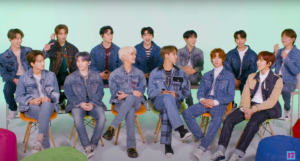
We are now past the days of Psy appearing on The Ellen DeGeneres Show to teach Ellen DeGeneres and Britney Spears how to dance to “Gangnam Style.” Groups like Black Pink, Super M, NCT 127, and of course BTS, have made appearances on American talk shows as part of their promotional circuit. Aside from TV, there are also a plethora of non-TV platforms that frequently feature K-pop idols. One such example is Buzzfeed, and others include but are not limited to magazines such as Seventeen, ELLE, and Teen Vogue. These channels feature a larger variety of K-pop artists than American TV does, and it indicates how K-pop artists and these platforms alike are pandering to an international K-pop fandom. Sure, many of the idols still speak in Korean and the videos are subtitled, but the significance of these videos is undeniable. They help reach international fans and audiences who do not have to wait to access (fan) subtitled content. The market for K-pop is not limited within South Korean borders, and one such way to reach these audiences is through a globally accessible language.
Aside from promotional content, English is also used in interactions with and between fans. Platforms meant for communication with fans, such as Weverse, come with built-in translation tools to help interact with international fans. Even without the translations that social media networks provide, K-pop idols sometimes take initiative to interact with fans in English on their personal social media, even if they may not be fluent in English. Take, for instance, Sungjin of Day6’s amusing and endearing Twitter. K-pop groups and their companies often provide English translations because of international fan bases outside of Korea. Instead of providing translations and descriptions in every language, English serves as the default lingua franca when addressing fans outside of the East Asian audience.

Even interactions between fans often take place in English. Research by Zunera Malik and Sham Haidar suggest that in the world of K-pop stan Twitter, English is the lingua franca used by fans from all over the globe. In fact, the article argues that the K-pop stan Twitter can serve as an educational source for English language learners. Even in the fan culture, another important part of the K-pop experience, English is a prominent lingua franca.
Aside from its role as a lingua franca, the most obvious presence of English in K-pop is through English releases, which have become more significant as they can help with increased exposure, especially in the influential US music market. A notable example is “Dynamite,” which cannot be excluded from any discussion of memorable K-pop releases of this year. The disco-inspired song and MV broke records and has become yet another significant milestone for BTS, but “Dynamite” also contradicts what BTS said previously about not planning on English releases. Yes, the song might have been a fun surprise for fans in need of cheering up during a pandemic, but it is also a strategic move. The English release provided the already-impressive group the nudge they needed for further stardom and recognition. Their songs in Korean obviously did not stop them from becoming a global phenomenon, but a switch to English made BTS approachable in a way that their other releases were not. In comparison to their other songs, “Dynamite” was played extensively on the US radio, and they were even nominated for a Grammy. People may have been unwilling to overcome that “one-inch tall barrier of subtitles” required to interpret their music, but they certainly did not need to for “Dynamite.” If you simply heard the song without any context, it would be difficult to connect it back to the seven-member K-pop group known especially for their music that provides a message of self-confidence and hope for youth.
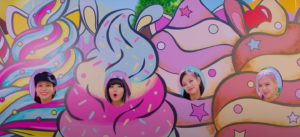
The previous statement brings up a topic that often goes hand-in-hand with English releases in K-pop. Do these releases even count as K-pop? K-pop has come to signify a broad range of genres, artists, and songs, but the defining factor that unites them as K-pop is harder to pin down than you would think. So, do English releases from K-pop artists not count as K-pop? What about a song like “Ice Cream” by Black Pink and Selena Gomez that has one verse in Korean?
Perhaps the debate surrounding English releases is because they sometimes include a change in sound too. For example, Monsta X’s album All About Luv, released earlier this year, is different from their previous music in two ways. First, the lyrics are all in English, and second, the sound is much different than what they are usually known for. A far departure from their usual intense title tracks, the album’s overall sound is smooth, sleek, inoffensively catchy, and very (US) radio playable. Monsta X’s Korean releases since, however, have been more in line with their usual sound. Their All About Luv album is a pointed approach to gaining exposure and recognition in a global music market where English still remains the most familiar language. However, their shift in sound suggests that maybe English releases from K-pop artists are supposed to be easy and accessible in terms of both lyrics and sound. “Dynamite” certainly was. Perhaps All About Luv and “Dynamite” set a precedent, but we will have to see what future English releases from K-pop artists bring to the table.
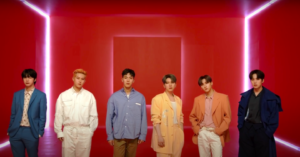
English plays a critical role in reaching, engaging, and gaining recognition from an international audience and will continue to be a prominent language alongside Korean in K-pop. Though it was first incorporated into K-pop to engage Korean youth, it has transformed into an important communicative tool and method of increased exposure. For now though, as a year that was not as full of “shining through the city with a little funk and soul” as we would have hoped draws to a close, K-pop fans can look forward to the Grammys and if “Dynamite” and BTS will yet again make history.
(Oxford English Dictionary, TIME, Korea Herald, Chicago Tribune, Linguistic hybridization in K‐Pop: discourse of self‐assertion and resistance by Jamie Shinhee Lee in World Englishes, Critical Interpretation of Hybrid K-Pop: The Global-Local Paradigm of English Mixing in Lyrics by Dal Yong Jin and Woongjae Ryeo in Popular Music and Society, English language learning and social media: Schematic learning on Kpop Stan twitter by Zunera Malik and Sham Haidar in E-Learning and Digital Media. Images via Big Hit Entertainment, JYP Entertainment, YG Entertainment, Starship Entertainment, Seventeen Magazine, CBS)


